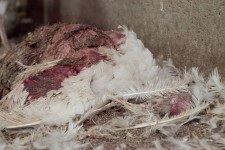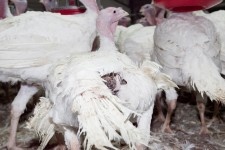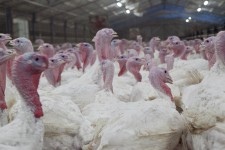- Overview
- Confinement
- Turkey poults
- Mutilation
- Artificial lighting
- Health Concerns
- Use of antibiotics
- Genetic alterations
- Muscle disorders
- Skeletal disorders
- Lame and injured birds
- Mortality rate
- Artificial insemination
- Health problems of breeders
- Slaughterhouse
- Turkeys: sentient and intelligent
- Conclusion
- References
Genetic Alterations
Factory-farmed turkeys have been genetically altered and bred to grow bigger and faster in order to meet the consumer demand for breast meat. Inducing such rapid body growth creates a number of health problems for these birds.(34) Both male and female factory-farmed turkeys are almost twice the size of their wild counterparts. For example, a female wild turkey (hen) typically weighs approximately 4kg(35), while factory-farmed hens can weigh up to 8kg or more.(36) A wild male turkey (tom) can weigh up to 9kg(37), whereas a factory farmed tom can weigh 17kg or more.(38)
Another study has shown that the growth rate of turkeys (to 16 weeks) has doubled. This study showed that non-factory-farmed turkeys weigh 11.5kg (at 54 weeks) whilst a commercially raised male turkey can weigh up to 27kg.(39) In Australia, turkeys are slaughtered at approximately 10 to 12 weeks of age(40) but the toms can sometimes be kept up to 16 weeks of age(41). On average, the birds gain about 1kg a week.(42)
One report explains:
If a 3kg (human) baby grew at the same rate that today's (factory farmed) turkey grows, when the baby reached 18 weeks, it would weigh approximately 227 kg.(43)
As a result factory-farmed turkeys suffer painful health problems such as crippled legs and swollen joints.(44) They have also been so genetically altered that a range of muscle and skeletal disorders often make them barely able to walk.(45) Unfortunately, the breeding companies still aim to produce ever-increasing growth rates, perpetuating these serious welfare issues.(46)




